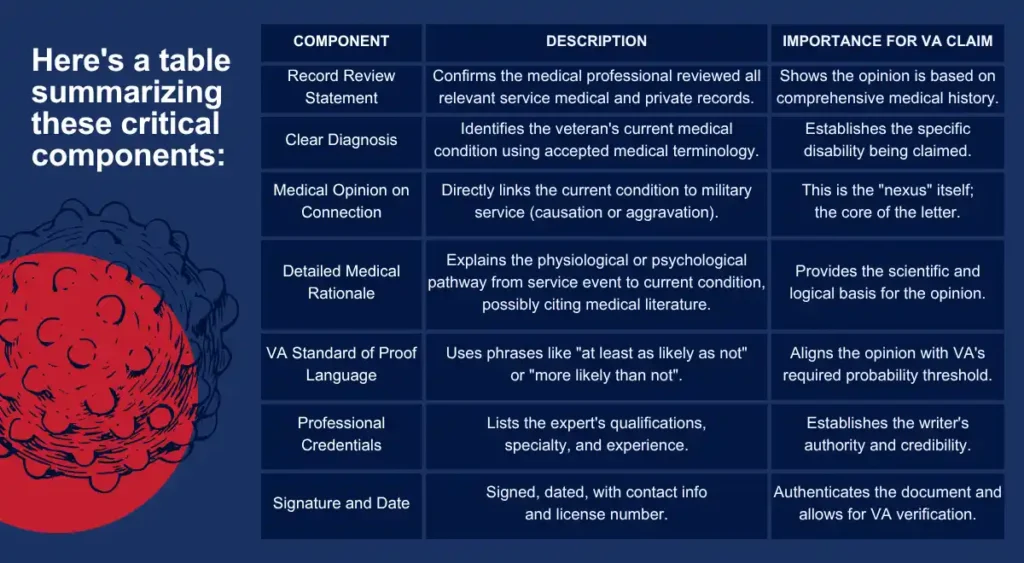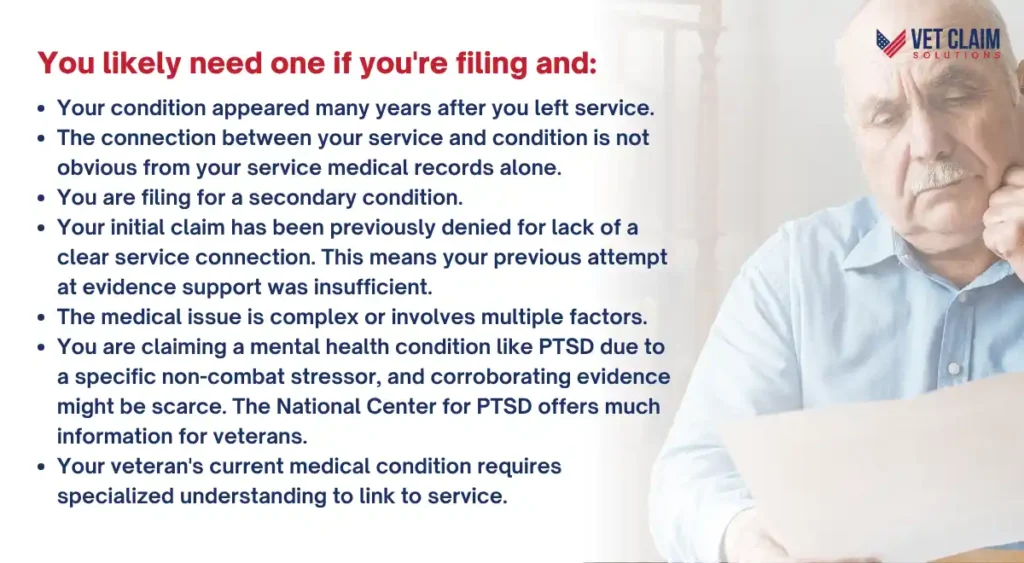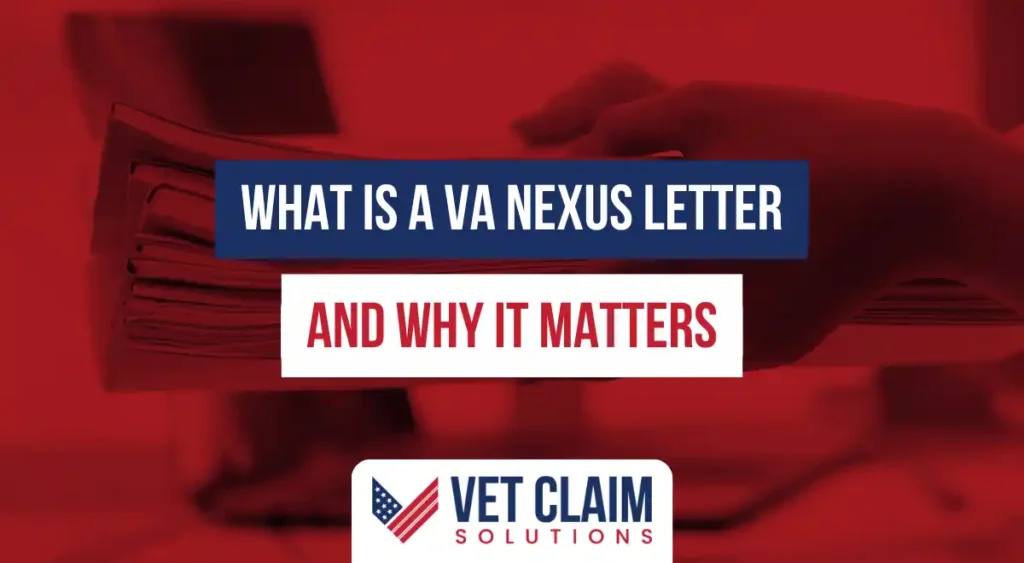Filing a VA disability claim can feel overwhelming. You have forms, medical records, and so much information to sort through. Many veterans wonder about what makes a va claim successful; a key piece of this puzzle is often a VA Nexus Letter. This article will explain the essentials of a VA nexus letter: what it is, who can write one, and why it is so important for supporting your va disability claim and helping you in receiving va disability benefits.
Understanding the purpose and impact of a nexus letter can truly make a difference in your journey to obtaining the disability benefits you earned through your military service. It provides critical medical evidence for your case. We will explore how an effective nexus letter can strengthen your initial claim.

Understanding the Core: What is a VA Nexus Letter?
So, what exactly is this letter? A VA Nexus Letter is a document authored by a medical professional. It aims to connect a veteran’s current medical condition directly to their time in military service. The word “nexus” itself means a connection or link, and this letter provides that vital link for the VA when assessing va disability claims.
The primary purpose of a nexus letter is to show the Department of Veterans Affairs (VA) that your disability is service-connected. This means your illness or injury was caused by, or worsened during, your active duty. Without this explicitly documented connection, your va claim might face significant hurdles or even be claim denied.
Think of it as a meticulously constructed bridge. It connects your current health problem, the veteran’s current medical condition, back to specific events, injuries, or exposures during your military service. This bridge is built with medical expertise and a thorough review of your history, including service medical records.
A medical professional explains in the letter how one thing led to another. This is central to understanding nexus. This letter offers clarity for the VA rater reviewing your disability claim.
Why a Nexus Letter is So Important for Your VA Claim
This letter isn’t just another piece of paper in your va disability claim. It often plays a crucial role in the VA’s decision-making process for va claims. For many veterans, it’s the element that tips the scales toward claim approval and receiving va disability benefits.
The VA needs to see a clear medical link; the medical nexus letter provides this. The VA reviews all evidence submitted, including medical evidence. A strong, well-written nexus letter provides a qualified medical opinion from a healthcare professional, which can carry significant weight. This expert medical opinion helps the VA rater understand the medical reasoning behind your disability claim, potentially leading to a higher disability rating.
It’s especially vital for conditions that are not automatically presumed to be service-connected. Also, if a lot of time has passed since your service, a nexus letter becomes even more important. It helps explain how a past event from your military service is causing current issues and how your current condition relates to that service. The claims process can be smoother with such evidence support.
Defining the Nexus Letter: Purpose, Authorship, and Claim Support
The entire topic of a VA nexus letter and its importance centers on providing proof. You need to show the VA that your military service is the reason for your veteran’s current medical condition. The letter helps you do just that in a way the VA understands, strengthening your argument for service connection.
Only certain individuals can provide a credible nexus letter. It needs to come from a qualified medical professional or medical expert. This expert must understand your condition and your service history. Their expertise, often highlighted by professional writing, is what makes the letter valuable for your va claim.
The letter supports your claim by giving a medical opinion on causation. It directly addresses whether your service “at least as likely as not” caused or aggravated your condition. This specific phrasing is important for the VA and for receiving va disability. The power of a strong nexus letter cannot be understated when you’re filing for benefits.

Who is Qualified to Write Your Nexus Letter?
Not just any doctor can write a persuasive nexus letter for your va disability claim. The VA looks for opinions from competent medical sources. This typically means licensed physicians, like an MD (Medical Doctor) or DO (Doctor of Osteopathic Medicine). A healthcare provider with experience in similar disability claims is often preferred.
For mental health conditions, a psychologist or psychiatrist is usually the best choice. Physician assistants (PAs) and nurse practitioners (NPs) may also write nexus letters for va claims. Their ability to do so can depend on state laws and their supervising physician’s oversight. The medical professional writing the letter must be familiar with your medical history and the specifics of your current medical condition.
The key is that the professional must have enough knowledge about your specific medical condition. They also need to be able to review and understand your service medical records and military personnel file. General practitioners can sometimes write letters, but a specialist often carries more weight for complex conditions, providing a more effective nexus letter. Their understanding of medical nexus principles is critical.
It is beneficial if the medical professional explains the connection in clear, unambiguous terms. A well-written nexus letter from a credible source can be a powerful tool. The medical professional should also be comfortable with the specific language and standards required by the VA, like the “at least as likely as not” criterion.
Can Your VA Doctor Write a Nexus Letter?
This is a common question from veterans preparing their va claim. Yes, sometimes a VA doctor can write a nexus letter. However, it’s not always straightforward. Some VA doctors are willing and able, while others may be hesitant or state they cannot due to internal policies or time constraints.
VA policy does not prohibit their doctors from writing these letters for va disability claims. But, they are not required to do so. If your va doctor knows your medical history well and is supportive, they might provide a helpful statement or letter; it’s part of understanding nexus. Always ask them politely and explain what you need for your disability claim.
Sometimes, a VA doctor might only be willing to fill out a Disability Benefits Questionnaire (DBQ). A DBQ can be very helpful medical evidence but is not exactly the same as a detailed nexus letter. You might need both to build a strong va disability case and avoid having your claim denied. The letter offers a narrative explanation that a DBQ might not fully capture.
Private Doctors and Independent Medical Examiners
Many veterans turn to private doctors or independent medical examiners (IMEs) for nexus letters. These professionals often have more experience specifically in writing these types of opinions for VA claims and are skilled in medical professional writing. They operate outside the VA system, providing an independent medical opinion.
A private doctor who has treated you for a long time might be a good option as your healthcare provider. They know your veteran’s current medical condition well. However, they may need guidance on what the VA requires in a nexus letter. Some private doctors may charge a fee for this service, as crafting an effective nexus letter takes considerable time.
IMEs are medical professionals who specialize in evaluating individuals for legal or benefits purposes, including va disability. They conduct a thorough review of records, including military service medical records, and sometimes an examination. Their expert medical opinion is often very detailed. Getting an IMO can be an investment, but it can be worthwhile, especially for difficult disability claims or during the appeals process. Many organizations offer help to veterans seeking resources and support, which might include finding qualified IMEs for their va disability claim.
Critical Components of an Effective Nexus Letter
A strong nexus letter contains several key elements. It’s not just a note saying you have a condition; the letter needs to be well-reasoned and evidence-based to support your va claim. These elements help the VA understand the connection between your service and your current medical condition.
For a nexus letter to be truly effective, it generally needs to include these components. What a nexus letter include is vital for its success. These are key elements to look for:
- A statement that the doctor or medical expert has reviewed your relevant medical records. This includes service treatment records (service medical records), private medical records, and current VA medical records.
- A clear medical diagnosis of your current condition, which is the veteran’s current medical condition.
- A medical opinion that connects the diagnosed condition to a specific incident, injury, or illness in service. Or it could state how service aggravated a pre-existing condition, showing how the condition relates to military service.
- A detailed medical rationale. This explains, in medical terms, how the service event led to or worsened the current condition. It might cite medical literature or studies if relevant to provide robust evidence support.
- Use of the VA’s standard of proof. The letter should state that it is “at least as likely as not” (a 50% or greater probability) that your condition is related to service. Other phrases like “more likely than not” are also strong.
- The doctor’s credentials and expertise. The letter should show why their opinion is authoritative (e.g., their specialty, years of experience, familiarity with va disability claims).
- It must be signed and dated by the medical professional. Their contact information and license number are also important.
The letter should be clear, concise, and avoid jargon where possible, or explain it. It must directly address the link the VA needs to see. A simple statement like “Patient’s back pain is due to military service” is not enough; the letter must explain how and why for it to be a powerful tool in the va claims process. An effective nexus letter offers a reasoned explanation.
Here’s a table summarizing these critical components:

Each of these parts contributes to making the letter effective. Missing any of these could weaken your disability claim and affect your chances of receiving va disability benefits or achieving a higher disability rating.
How a Nexus Letter Strengthens Different Types of Claims
Nexus letters are useful for various types of service connection claims for va disability. Their role is to provide the medical link, no matter how the condition arose. This helps establish the all-important service connection, which is foundational to receiving VA disability benefits.
Direct Service Connection
This is the most common type of va claim. An injury or disease happened or started during your military service. For example, you injured your knee during a training exercise documented in your service records. Years later, you have chronic knee pain and arthritis, impacting your veteran’s current quality of life.
A nexus letter would explain how the original in-service injury is medically linked to your current knee problems. The doctor, a qualified healthcare professional, would review records of the injury. Then they would explain the progression to your current diagnosed condition, providing crucial medical evidence.
This type of letter explicitly documented the chain of events. It demonstrates that the current medical condition is not a new, unrelated issue. Instead, it is a direct consequence of an event or exposure during military service.
Secondary Service Connection
This applies when a service-connected condition causes or aggravates another, new condition. For example, if your service-connected diabetes (Type II diabetes can be presumptively linked to Agent Orange exposure) leads to neuropathy in your feet. The neuropathy is a secondary condition eligible for va disability benefits.
A nexus letter for secondary service connection would explain the medical link between the primary service-connected condition (diabetes) and the secondary condition (neuropathy). It establishes that the first condition caused the second. This can significantly increase your overall disability rating and the amount of va disability you receive.
The medical professional explains the physiological process. For instance, how poorly controlled diabetes damages nerves, leading to neuropathy. This is a critical part of the va claims process for secondary conditions. The letter offers proof that one condition relates to another service-connected issue.
Aggravated Conditions
Sometimes, a condition existed before you entered service. But, your military service made it permanently worse, beyond its natural progression. This is known as aggravation, and it can be a basis for a va disability claim.
A nexus letter for an aggravated condition is very specific. It must show that your service made the pre-existing condition worse. It also has to differentiate the worsening due to service from how the condition might have naturally progressed over time, a key factor in the disability claims process.
For example, you had mild flat feet before service. But, extensive marching and load-bearing in the military, documented in your military service medical records, caused painful, chronic plantar fasciitis. A nexus letter would detail how military duties aggravated your flat feet beyond their normal course, leading to your current medical condition. The expert medical opinion would be vital here.
Deciding If You Need a Nexus Letter for Your Claim
While not always a strict requirement for every single va claim, a nexus letter is highly recommended in many situations. It strengthens your case considerably. Certain circumstances make a nexus letter almost essential for receiving va disability benefits.

For conditions on the VA’s presumptive list, a nexus letter may be less critical. These are conditions VA presumes are service-connected if you served in a certain place at a certain time (e.g., Agent Orange exposure). However, even with a presumptive condition, if your specific case has complexities, or if you want to aim for a higher disability rating, a letter can still be beneficial to your va disability claim.
Practical Steps to Getting a Helpful Nexus Letter
Getting a strong nexus letter involves a few steps. You need to be proactive and prepared. Good communication with the medical professional, your chosen healthcare provider, is fundamental to getting an effective nexus letter.
First, talk to your chosen doctor or medical expert. Explain that you are filing a VA disability claim. Tell them you need a medical nexus letter to help establish service connection for your current medical condition. Be clear about what you need from them and how this letter offers vital evidence support.
Next, gather all your relevant records. This includes your service medical records (SMRs), any private medical records related to the condition, and current VA medical records if you have them. Give these to the doctor. The more information they have from your service records and medical history, the better their expert medical opinion will be. Highlighting relevant parts of your records can be very helpful for the doctor, especially entries from your military service medical documentation.
You might need to educate your private doctor a bit about what a VA nexus letter needs to include. Explain the “at least as likely as not” standard, a cornerstone of the va claims process. Provide them with examples or templates if they are unfamiliar with professional writing for VA purposes. Be prepared to discuss any potential fees if you are using a private physician or IME service for this medical professional writing, as these fees are your responsibility.
Finally, follow up respectfully. Doctors are busy. A polite reminder or offer to provide further clarification can be helpful. Once you receive the letter, review it to make sure it contains all the necessary elements and clearly supports your va claim before submitting it.
Avoiding Common Pitfalls with Your Nexus Letter
Not all nexus letters are created equal. Some common mistakes can weaken your letter. Or they might even make it unhelpful to your va disability claim. Knowing these pitfalls can help you avoid them and prevent your claim denied status.
A very common mistake is a letter that is too vague. Opinions like “it is possible” or “it could be” are not strong enough. The VA needs a definitive statement using the “at least as likely as not” standard or stronger. The medical professional writing the letter must clearly state their opinion on causation for the letter effective impact.
Another pitfall is a letter from an unqualified source. For example, a letter from a chiropractor for a complex cardiac condition will likely not carry much weight. The writer’s expertise must match the condition being claimed. Always verify the credentials of the person writing your letter to support your disability claim.
Make sure the letter shows the doctor reviewed your records. A letter based only on your current symptoms, without considering your military service history, is weak. The review of service medical records is what links your present veteran’s current medical condition to your past service. Also, avoid letters that simply repeat what you told the doctor; the letter needs to provide their independent medical reasoning and expert medical opinion.
A letter that is too brief and lacks medical rationale will also fail. It needs to explain the ‘how’ and ‘why’ of the connection for your va claim. Conversely, a letter that is overly long and rambling might obscure the main points. Clear, logical, and well-supported opinions are best for receiving va disability benefits and potentially a higher disability rating.
Lastly, ensure the letter is legible and uses professional language. A poorly written or difficult-to-read letter reflects badly on the opinion, even if the medical reasoning is sound. The primary purpose is clear communication of a medical nexus. An ineffective nexus letter will not help your case.
The Nexus Letter and the VA Appeals Process
If your initial claim is denied, a VA nexus letter can become even more critical during the appeals process. A common reason for a claim denied outcome is the VA determining there’s no clear link between your condition and your service. A new or stronger nexus letter can directly address this deficiency.
When you enter the VA appeals process, you often have the opportunity to submit new and relevant evidence. An effective nexus letter, perhaps from a different medical expert or one that addresses specific reasons for the previous denial, can be powerful. This new medical evidence can provide the missing link or clarify points the VA previously found unconvincing in your va disability claim.
A strong nexus letter is particularly important for higher-level reviews or appeals before the Board of Veterans’ Appeals. The letter offers a medical professional’s analysis that can counter the VA’s reasons for denial. Having a medical expert explicitly documented the connection with thorough rationale gives your appeal a much stronger foundation for success in receiving VA disability.
Sometimes, the initial denial will point out weaknesses in the submitted medical evidence. Use this feedback to obtain a more targeted and effective nexus letter for your appeal. The appeals process is complex, but a compelling nexus letter can be a key factor in overturning a denial and finally getting the disability benefits you are entitled to. It demonstrates that the veteran’s current condition is indeed service-connected.
Conclusion
A VA Nexus Letter can be a cornerstone of a successful va disability claim. Understanding its role, who should write it, and what makes a letter effective gives you a powerful tool. It provides the crucial medical link—the medical nexus—between your current health condition and your dedicated military service. This link, supported by strong medical evidence and clearly stated in the nexus letter, is what the VA needs to see when processing disability claims.
Getting a well-crafted letter from a qualified healthcare professional who has reviewed your service records and can offer a solid medical opinion often makes the difference between claim approval and a claim denied. This can significantly impact your ability to start receiving va disability benefits or achieve a higher disability rating. This information should help you work to get the disability benefits you deserve for your service to our country, easing your path through the va claims process.


